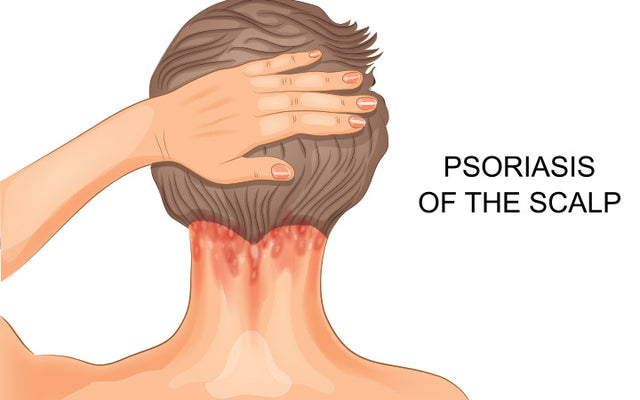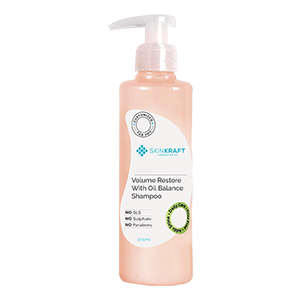Here’s some harsh truth: Almost half of the world’s population, which has experienced a type of skin psoriasis called plaque psoriasis, have developed it on their scalp too! These numbers have been published by the American Academy Of Dermatology (AAD).
Now, here’s some relief: Scalp psoriasis can very much be treated with the right diagnosis, precautions and solutions. But first, you need to understand its symptoms and why exactly it occurs before you jump to the treatments. So, let’s get started.
Highlights:
- What Is Scalp Psoriasis?
- What Does Scalp Psoriasis Look Like?
- What Causes Scalp Psoriasis?
- How Severe Can Scalp Psoriasis Get?
- Symptoms Of Scalp Psoriasis
- Can Scalp Psoriasis Cause Hair Fall?
- Topical Treatments For Scalp Psoriasis
- Oral Treatments For Scalp Psoriasis
- Light Therapy For Scalp Psoriasis
- Herbal/Natural Methods To Treat Scalp Psoriasis
- Tips To Manage Scalp Psoriasis Symptoms
- What Will Happen If You Don’t Treat Scalp Psoriasis?
- How Long Does Scalp Psoriasis Last?
- Does Picking At Scalp Psoriasis Make It Worse?
- Is Scalp Psoriasis Contagious?
What Is Scalp Psoriasis?
Scalp psoriasis is an autoimmune disease that causes red, flaky, scaly and raised patches of skin on the scalp. There is a possibility of this condition to spread to the back of your neck, your ears and forehead.
What Does Scalp Psoriasis Look Like?
Scalp psoriasis is characterized by red, raised patches of skin on the scalp. Here are some scalp psoriasis pictures to help you understand exactly what it looks like:


What Causes Scalp Psoriasis?
The exact cause of scalp psoriasis is unknown. However, doctors associate this condition with immune system responses that cause skin cells to grow rapidly, resulting in these patches. A person is likely to develop the condition if they have a family history of it.
How Severe Can Scalp Psoriasis Get?
Scalp psoriasis can be mild, moderate or severe. Mild psoriasis is almost unnoticeable. However, severe scalp psoriasis can cause extreme itching and scaling of the skin. Scratching these patches can even result in hair loss.
Symptoms Of Scalp Psoriasis
The symptoms of mild scalp psoriasis include some scaling. However, moderate to severe scalp psoriasis can have more adverse symptoms. These include:
- Scaly, red and bumpy patches
- White, scaly texture
- Flaky/itchy scalp
- Thin skin
- Dry scalp
- Burning of scalp patches
Can Scalp Psoriasis Cause Hair Fall?
The condition alone does not result in hair loss. However, if the severity of itchiness is too high, then constant scratching of the scalp can cause a person to lose their hair.
Harsh treatments can also result in hair fall. However, this is usually a temporary symptom. Your hair is most likely to grow back when your skin clears up.
Topical Treatments For Scalp Psoriasis
Topical treatments may be recommended by your doctor initially, to prevent scaling and itching. In case this doesn’t work, treatment may progress into other forms of medications. Here are some of your treatment options:
1. Shampoos
Your doctor may prescribe shampoos containing salicylic acid, tar or selenium shampoos to reduce symptoms of scalp psoriasis. If scaling is too thick, it may be recommended for you to practice this two times a day. Rubbing off the scales gently is important to avoid traumatizing the skin.
What Ingredients Should You Look For?
A. Salicylic Acid
It gently helps the outer layer of the skin to shed off. Salicylic acid may irritate the skin and cause it to get dry. It may also weaken the hair follicles, causing it to fall off.
B. Clobetasol Propionate
This ingredient is considered to be relatively safe and highly effective in reducing scalp psoriasis symptoms, when used in concentrations of 0.05 percent.
C. Tar
Shampoos containing tar may be recommended in concentrations between 2-10 per cent. Tar is known to slow-down the growth of skin cells and reduce inflammation as well.
Word of Caution:
Tar used in high concentrations or doses may lead to cancer. Make it a point to use this ingredient as per your doctor’s directions.
2. Moisturizers
Heavy, thick moisturizers can soothe your skin as they lock-in moisture. They may also help prevent flare-ups.
3. Topical Corticosteroids
These are one of the most common topical medicines that are prescribed for scalp psoriasis. Topical corticosteroids slow down cell growth-rate. They are also effective in reducing inflammation.
Topical corticosteroids come in different strengths to address different areas of your skin. Talk to your doctor about which ones are recommended for you.
Side Effects of Topical Corticosteroids:
- Changes in the color of your skin/thin skin
- Bruising
- Stretch marks
- Broken blood vessels
If you experience any of these after starting medication, visit your doctor.
4. Salicylic Acid
Apart from shampoos, salicylic acid treatments also come in the other topical forms like lotions, creams, cloth pads, patches and gels. They can be used to reduce scalp psoriasis symptoms.
5. Vitamin D
Vitamin D-based medications can reduce the pace at which the skin cells grow. They also help in removing scales and flakes and are often used in combination with corticosteroids.
6. Vitamin A Derivatives
Vitamin A derivatives like Tazorec may be recommended to slow down cell growth. They come in the form of creams and gels. However, they may cause redness before healing the patch of skin.
Oral Treatments For Scalp Psoriasis
Oral treatments may be recommended for those with moderate to severe scalp psoriasis. They may be advised to be taken in combination with topical creams or lotions as well:
1. Methotrexate
Slows down an enzyme that contributes to the growth of skin cells.
2. Oral Retinoids
These also control the growth of skin cells.
3. Cyclosporine
Reduces immune system functions that trigger flare-ups and inflammation.
4. Biologics
These target the overactive parts of the immune system to prevent flare-ups. Medicines like Brodalumab have recently been approved by the FDA to be used as a treatment for psoriasis.
Note:
These drugs can make a person more prone to infections. In case you have any other diseases/infections, talk to your doctor before consuming these.
Light Therapy For Scalp Psoriasis
UV light can be used to reduce scalp psoriasis symptoms. This process uses a UV light that the scalp is exposed to, from time to time. This has to be done under your doctor’s supervision to prevent burns.
Note:
Do not expose yourself to tanning beds, as UV rays can cause a significant amount of damage to your skin.
Herbal/Natural Methods To Treat Scalp Psoriasis
According to the National Psoriasis Foundation, these herbal and natural remedies can be used to reduce psoriasis symptoms.
1. Aloe Vera
Creams containing 0.5 percent aloe gel can be applied to the skin to relieve you of symptoms. Studies suggest that aloe vera gel can reduce itchiness and scaling. You can also apply the gel from the aloe plant directly to your skin 3 times a day.
2. Apple Cider Vinegar
Apple cider vinegar helps relieve the itchiness associated with psoriasis. You can use organic apple cider vinegar and even dilute it in water to prevent burning.
Note:
Avoid applying the ingredient to places with open wounds.
3. Turmeric

Turmeric can help reduce symptoms associated with psoriasis. It possesses anti-inflammatory properties and can be taken in the form of supplements. Studies suggest that turmeric can help alter gene expression that reduces psoriasis symptoms.
4. Tea Tree Oil
Tea tree oil has antiseptic properties that can help relieve you of scalp psoriasis symptoms. A few drops can be added to your shampoo as well.
Note:
There are no studies that prove tea tree oil to be effective in treating psoriasis. Some people are allergic to tea tree oil. It is recommended that you conduct a patch test before using it.
5. Capsaicin
This can help reduce itchiness, but may even cause a burning sensation. Extensive research needs to be conducted on its safety and efficacy.
Tips To Manage Scalp Psoriasis Symptoms
1. Shower Using Warm Water Every Night
Shower with warm water every night to keep your scalp moist. Gently rub on some mild shampoo. Leave it on for 5 minutes and rinse off.
2. Keep Your Scalp Moist
After you shower, gently rub-in your OTC or any other topical leave-on medicines that have been prescribed to you. Cover your scalp with a shower cap before you get into bed to keep the area moist.
3. Visit Your Doctor
Psoriasis can be quite uncomfortable. You may want to visit your doctor to get a better understanding of what medication works for you best. This will help relieve you of symptoms.
4. Control Stress
Stress can trigger flare-ups. You can even practise deep-breathing and other ways of managing your stress.
5. Wash Your Hands Often
Wash your hands regularly to prevent strep throat or other illnesses.
6. Avoid UV Exposure
Exposing your scalp to UV rays can worsen the situation. Wear a hat and use sunscreen when you step-out in the day.
What Will Happen If You Don’t Treat Scalp Psoriasis?
Treating psoriasis and following up with your doctor is important to prevent flare-ups and other complications that come with psoriasis.
If You Leave Your Psoriasis Untreated, It Can:
- Cause permanent hair loss due to constant scratching.
- You may lose your nails and even notice changes in them.
- You may experience joint pain and stiffness in case you have arthritis. It can even cause permanent joint damage.
- You may develop erythrodermic psoriasis that occurs in those who discontinue medication too soon or without consulting their doctor. It is characterized by a sunburn like rash that can be widespread and results in peeling of the skin.
- Constant flare-ups can be uncomfortable and frustrating.
- You may become prone to other inflammatory diseases like heart disease, inflammatory bowel disease and others.
- The symptoms may cause you to get depressed and affect your mental health.
- Your quality of life may be compromised due to severe itching.
How Long Does Scalp Psoriasis Last?
In some people, psoriasis may take a few months or years to completely clear-up. Some others may experience cyclical flare-ups. For example, some people may experience flare-ups in winters than in summers.
Does Picking At Scalp Psoriasis Make It Worse?
Constant picking of your scales can worsen the situation. It’s not contagious, but may result in an itch-scratch-pick cycle that traumatizes your skin.
Is Scalp Psoriasis Contagious?
Scalp psoriasis is an autoimmune disease that is not transmitted by physical contact. It is not a contagious disease.
Wrapping Up
Now you know that this autoimmune condition causes red, scaly patches of skin on the scalp and sometimes, on the areas around it. OTC and topical treatments may help reduce mild psoriasis symptoms. However, for moderate to severe scalp psoriasis, oral medication or light therapy may be prescribed by your doctor. Following your doctor’s directions to control and reduce flare-ups is important to avoid complications.
Recommended Products
Was this Article helpful?
- Least helpful
- Most helpful





